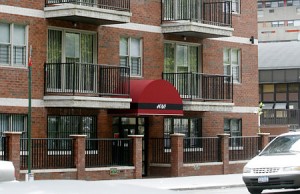Posted by Teresa on December 7, 2010 under Tenant Credit Checks, Tenant Screening & Background Checks | 
 Why Pre-Screen Tenant Applicants?
Why Pre-Screen Tenant Applicants?
There are several advantages to screening tenants prior to signing a lease. One is that you can avoid discrimination issues by applying the same approval standards to every lease applicant—including a standard background and credit check. Another advantage is the reduction of risk. Why take a chance on a tenant who could have a history of evictions or an income that cannot support the rent? Mitigate risk by conducting a thorough credit check on every tenant.
What Will I Learn From a Tenant Credit Check?
You can learn at a glance if your prospective tenant pays credit card bills and loans promptly, as well as if there are any outstanding judgments against him or her. Previous bankruptcies are also typically reported. or bankruptcy filings. You can determine the minimum level of approval for your applicants, based on a good record of responsible finances and living within their means.
Be sure to compare the report’s list of an applicant’s previous addresses with those provided on the lease application. Are there inconsistencies? If so, the tenant is hiding something, or there is a legitimate explanation. Either way, you need to know before you sign a lease.
The information you gather from a tenant credit report must be held in strictest confidence, and never shared with third parties. Your applicant may have a right to the report—check your state’s guidelines and the Fair Credit Reporting Act (FCRA) to be sure you are compliant. If you reject an applicant for credit reasons, you must advise them in writing. Your best and easiest way to screen tenants is through a reputable, professional tenant screening service.
Consistency Counts When Screening Tenants
It’s important to be consistent when it comes to pre-screening tenants.
- Screen all lease applicants, no matter how they look, dress, or what kind of car they drive.
- Use the same screening procedures for each prospective tenant. Exceptions could be interpreted as favoritism toward or discrimination against a certain group.
- Establish a clear policy of background checks on all applicants to protect your rental property business.
Remember! Use a screening service with nationwide coverage and access to all three credit bureaus.
Posted by Teresa on November 20, 2010 under Tenant Credit Checks, Tenant Screening & Background Checks | 
 When it comes to filling a rental vacancy, most landlords are happy to have several applications to choose from. But sometime, you don’t have a clear “winner” among your potential tenants. As the economy continues to slog along and unemployment shows no signs of easing up, it’s possible that the pool of potential tenants will just keep declining in quality.
When it comes to filling a rental vacancy, most landlords are happy to have several applications to choose from. But sometime, you don’t have a clear “winner” among your potential tenants. As the economy continues to slog along and unemployment shows no signs of easing up, it’s possible that the pool of potential tenants will just keep declining in quality.
What does a landlord do when the only applicants for a rental property have low income, no job, shaky references or no clear source of income?
The first thing to take a look at is each tenant’s credit history. If the applicants pay their bills on time, they will likely pay their rent on time. If all four have questionable credit checks, then compare incomes. For example, if Mary will be paying 2/3 of her income on the rent, but Jane makes enough to cover rent with just 1/3 of her take-home pay, many landlords would breathe easier signing a lease with Jane.
What about unemployed applicants? Landlords report they are seeing more applicants who report they are unemployed. Most receive unemployment benefits, but as everyone knows, they run out. Is an unemployed applicant a definite “no?” Not for some landlords. Devin says he checks other sources of income, such as child support and disability payments. If unemployment is a potential tenant’s sole source of income, he will typically deny the lease application.
For potential tenants who are self-employed, it’s not always easy to prove income. Ask for tax returns, bank statements, and several references—including, of course, former landlords. Money in the bank is a good indicator that the tenant lives below his or her means and knows the value of having cash reserves. And, note that the income reported to the IRS may or may not be indicative of the individual’s true income.
When landlords feel pressured to sign a lease with a less-than-perfect credit risk, it’s sometimes a little less painful to make it a six-month term rather than a full year’s lease. If the rent has been paid on time, you can always extend it for another six months. If not, it’s possible that the pool of potential tenants will have improved in six months.
Posted by Teresa on June 22, 2010 under Landlord Paperwork and Forms, Landlord Tips, Tenant Credit Checks | 
 If you’re a landlord who is not using written rental applications 100% of the time, here are 5 reasons why you should!
If you’re a landlord who is not using written rental applications 100% of the time, here are 5 reasons why you should!
- The practice makes everyone more comfortable. Perhaps there was a time when a handshake and a handful of cash were all landlords needed to start a lease. But in this era of liability, lawsuits, and legal obligations, proper paperwork is just a must. And tenants expect to fill out some form of application, too. It puts them at ease that you’re a legitimate business person who will handle the landlord/tenant relationship professionally.
- It can protect you from liability. Requiring a rental application from each prospective tenant over age 18, as well as the names of all children who will reside in your rental housing, could reduce your liability for accidents or injuries that occur on the rental property. When your rental application clearly states municipal code limits on number of residents, fire code regulations, and emergency contacts for each tenant, you are more protected in cases of emergency.
- It can protect your rental business from a discrimination lawsuit. Collecting the same information from every prospective tenant, then using the same criteria to choose each tenant, ensures that you are within the guidelines for discrimination laws. If you just talk to prospective tenants, and choose one based on whoever is most able to pay the rent, you could be setting yourself up for a lawsuit. A lawyer for a rejected applicant might have a great case, since you’d have no documentation as to why you chose a particular tenant. When you have paperwork like applications and credit reports to back up your decision, you’re covered.
- You can gather the information you need to perform a thorough tenant screening. Rental applications should contain name, address, previous addresses, employment information, social security numbers, driver’s license numbers, and all contact information. They should also contain a signature page authorizing you to pull tenant credit reports and tenant criminal background screening reports.
- You get a commitment from a prospective tenant. When landlords show apartments and rental houses, they too often let a great prospect get away. Presenting the prospective tenant with an application form and request for security deposit to “hold” the rental unit is a good way to get a commitment. Then, you can do a tenant screening to confirm he or she meets your criteria before signing a lease or rental agreement.
Legal disclaimer:
The contents of this article are intended for general information purposes only, and should not be relied upon as a substitute for obtaining legal advice applicable to your situation.
Posted by Teresa on May 7, 2010 under Tenant Credit Checks, Tenant Screening & Background Checks | 
 The Fair Credit Reporting Act (FCRA) established rules to protect privacy and guarantee report accuracy when businesses, banks, and rental property owners check consumers’ credit histories. Landlords are allowed to obtain tenant credit reports as long as they follow the FCRA’s provisions.
The Fair Credit Reporting Act (FCRA) established rules to protect privacy and guarantee report accuracy when businesses, banks, and rental property owners check consumers’ credit histories. Landlords are allowed to obtain tenant credit reports as long as they follow the FCRA’s provisions.
Specifically, when landlords obtain information about a potential tenant’s credit history, rental history, previous evictions or a variety of other pertinent personal information, and they use that information to determine what they require from the tenant, they must give the tenant an “adverse action notice.”
For example, a low credit score might mean the landlord requires a co-signer on a lease application. Or, a previous eviction may mean the tenant’s application is denied altogether. Even requiring a higher rent deposit is considered an “adverse action,” if it is based on information obtained in a consumer credit report. And really, if a landlord requires a higher deposit from Tenant B than from Tenant C, the only grounds he or she could base that decision on would be a tenant credit report—or else a discrimination claim under the Fair Housing Act could be in that landlord’s future.
When a landlord takes adverse action against a tenant applicant, the FCRA requires a notice to be supplied to the tenant. The notice must include:
- the name, address and telephone number of the Consumer Reporting Agency (CRA) from which the report was obtained;
- a statement that the CRA did not make and cannot specify the reasons for the adverse decision;
- a notice of the tenant’s right to dispute the accuracy of the information the CRA supplied;
- notice of the tenant’s right to a free credit report upon request from the CRA within 60 days.
The adverse action notice can be given verbally; however, a written notice is advised, since the landlord would then have proof of giving the notice to the tenant.
Even if the CRA is checking information that has nothing to do with the tenant’s credit, such as verifying tenant employment or income—an adverse action notice is required if that information is the basis of a denied application, higher security deposit, or other action required by the landlord.
There are serious legal ramifications for landlords who fail to supply notices required by the FCRA. Check with your attorney if your procedures are called into question, but in the meantime, educate yourself about your responsibilities under the law.
The Fair Credit Reporting Act is available online, so it’s easy to familiarize yourself with its provisions and updated requirements. And updates are done frequently, so it’s up to every rental property owner to stay informed on a regular basis.
Posted by Teresa on December 8, 2009 under Screening and Background Checks, Tenant Credit Checks, Tenant Screening & Background Checks | 
 Tenant screening involves conducting background checks on potential tenants. Typical checks include tenant credit check, criminal background check, and tenant rental history. Landlords and rental property managers also have the option to check previous addresses, identity and name validation, address validation, evictions, liens, bankruptcies, and sex offender status.
Tenant screening involves conducting background checks on potential tenants. Typical checks include tenant credit check, criminal background check, and tenant rental history. Landlords and rental property managers also have the option to check previous addresses, identity and name validation, address validation, evictions, liens, bankruptcies, and sex offender status.
Here are some dos and don’ts to consider when making the decision to screen tenants:
- Do keep the screening process consistent: screen every applicant, every time.
- Don’t make yourself vulnerable to discrimination suits by screening applicants based on appearance or other subjective attributes.
- Don’t skip the tenant screening for an applicant who speaks well or dresses nicely, or the tenant applicant who drives a nice car—again, these are subjective observations that do not mean they will pay rent on time.
- Do protect your other tenants and the neighbors surrounding your rental property by including criminal history in your background check process.
- Do choose your screening service carefully. Are they a Better Business Bureau Accredited Business and Fair Credit Reporting Act (FCRA)-Compliant Consumer Reporting Agency? Is the staff FCRA Certified and Bonded?
- Do ensure that your screening service employs high security measures, such as fingerprint scanners, controlled access, monitored facilities, and proper disposal techniques.
- Don’t use a screening service without nationwide coverage and access to all three credit bureaus.
- Do keep all information learned from a tenant credit report in strictest confidence.
- Don’t neglect to provide a tenant applicant with a copy of the report, and to advise them in writing if you reject them for credit reasons.
Posted by Teresa on September 21, 2009 under Screening and Background Checks, Tenant Credit Checks, Tenant Screening & Background Checks | 
 It’s rather difficult to find anyone who has not been affected by the economic troubles of the past year. That includes people who want to be your tenants. What should you look for when running tenant credit checks these days? If everybody’s credit is bad, why bother to do a credit check? Should landlords and property managers lower their standards in light of the rise in rental vacancies? Read on for answers to these questions.
It’s rather difficult to find anyone who has not been affected by the economic troubles of the past year. That includes people who want to be your tenants. What should you look for when running tenant credit checks these days? If everybody’s credit is bad, why bother to do a credit check? Should landlords and property managers lower their standards in light of the rise in rental vacancies? Read on for answers to these questions.
Why bother with a tenant credit check when it’s going to be bad? Besides, if I skip it, I save money, right? Actually, the money you invest by doing thorough tenant screening will more than pay for itself when you consider the long term cost of evicting and/or cleaning up after bad tenants. And believe it or not, lots of folks are making it through the down economy by spending less, saving more, and keeping their credit records clean.
Should I lower my standards? This is a tough rental market, with rents down and vacancies up. You must decide whether to keep your qualifying standards high—and face empty units—or take a chance by lowering them in order to fill your properties. Experienced landlords say that empty units are far better than renting to bad tenants. It all depends on your tolerance risk, your cash flow—and a lot of luck.
Can I ask why a prospective tenant has had a bankruptcy? Yes. There is no time like the beginning to start communicating clearly with your tenants. If there is a bankruptcy on the credit check, ask what happened. You may find out that medical bills forced the tenant into bankruptcy, or that an ex spouse was actually the cause. Of course, if the tenant has other red flags on the credit report, you must take them into consideration, too.
Take a wide-angle view of the tenant’s credit history. If a bankruptcy is several years in the past, and everything else checks out, they may be an acceptable risk. If the bankruptcy was due to a business failure, the economy could be to blame—not the tenant. Past evictions and utility judgments are a higher risk indicators to many landlords than bankruptcies.
Do not ignore your gut instinct. If someone seems untrustworthy, they very well might be. Only you can decide whether a poor credit score or bankruptcy is worth the risk. The important thing is to perform consistent tenant credit checks!
Posted by Teresa on September 14, 2009 under Screening and Background Checks, Tenant Credit Checks, Tenant Screening & Background Checks | 
 Pre-qualifying tenants means a good start to a mutually respectful, mutually beneficial landlord/tenant relationship. So what exactly is pre-qualifying, and how do you begin to implement this strategy? Here’s a list of what pre-qualifying is and is not:
Pre-qualifying tenants means a good start to a mutually respectful, mutually beneficial landlord/tenant relationship. So what exactly is pre-qualifying, and how do you begin to implement this strategy? Here’s a list of what pre-qualifying is and is not:
- Pre-Qualifying is about finding the people who fit the minimum requirements you set for income, references, job and credit history. Proper tenant screening will further narrow the field by giving you solid background check results to base your decision on.
- Pre-Qualifying is not about discrimination. As a landlord, federal law prevents you from using a person’s race, color, religion, nationality, familial status, age, gender, or disabled status to determine housing eligibility. Your state may have additional guidelines.
- Pre-Qualifying is about laying the groundwork for a great landlord/tenant relationship by communicating clearly and effectively from the start.
- Pre-Qualifying is about reducing tenant turnover by avoiding broken lease agreements and evictions.
- Pre-Qualifying is not about judging applicants based on personal appearance, the car they own, or the number of people in their family unit.
- Pre-Qualifying is about applying the same rules and requirements to all applicants.
- Pre-Qualifying is a way to reduce your risk by keeping tenants with previous criminal convictions or negative rental histories out of your rental properties.
- Pre-Qualifying is started by advertising your property for rent in the right publications, including enough information to weed out individuals who are not a good fit for your rental.
Every landlord should consider pre-qualifying tenants. While it takes effort to begin any new procedure, it will soon be a habit—and this is a habit that will pay off through better relationships with your tenants and increased profits for you!
Posted by Teresa on August 25, 2009 under Landlord Tips, Rents and Deposits, Tenant Credit Checks | 
 As the housing marketing continues to struggle, many landlords are finding themselves in a tough spot. Perhaps you’re one of them: vacancies are rising, your bank is tightening up your credit line and won’t refinance your mortgage, and you really need a positive cash flow.
As the housing marketing continues to struggle, many landlords are finding themselves in a tough spot. Perhaps you’re one of them: vacancies are rising, your bank is tightening up your credit line and won’t refinance your mortgage, and you really need a positive cash flow.
If your tenants are smart, they know that in some areas, it’s a renter’s market—and they could be planning to ask you for a rent reduction, especially if they feel they’re paying more than the market dictates.
What should a landlord do if a tenant asks for lower rent?
- Determine whether or not your tenant has a valid case for a reduction in rent. Look at your local rent market, and compare your rents to similar units. You should always be aware of the fair market value in your area—and there are plenty of resources to guide you.
- Analyze your cash flow. If you determine your rent is above market value, but you can’t lower the rent and stay profitable, look for ways to reduce expenses. Perhaps you can take over landscaping duties from your contracted service. Or, perform small repair and maintenance yourself for awhile. You could even offer a compromise, such as keeping the rent the same, but covering some utility costs.
- Analyze the tenant’s history. Does the tenant pay on time every month? Have there been any complaints against them? How careful are they with your property? If they have been a great tenant, compare the rent reduction request with the hassle of finding a new tenant. You may find that peace of mind will make the reduction more palatable.
- Advise that you will be conducting a tenant credit check—and then follow through. If your tenant’s credit status has changed since the lease was signed, a thorough screening is the only way to find out. You may discover credit problems that indicate the tenant is not a good candidate for lower rent negotiations.
As a landlord, you are in a constant balance act to obtain and keep good tenants who pay on time. As the economy starts to slowly recover, you may have to concede to belt-tightening or reducing rents in order to attract and keep your best tenants.
Posted by Teresa on August 14, 2009 under Landlord Tips, Tenant Credit Checks, Tenant Screening & Background Checks | 
 Some people love being landlords. But not everyone does—and not everyone who invests in rental property is cut out for the job. It’s hard work and can be very stressful at times.
Some people love being landlords. But not everyone does—and not everyone who invests in rental property is cut out for the job. It’s hard work and can be very stressful at times.
Whether you’ve been a landlord for ten years or ten months, the time could come when you’re not sure you want to keep going. Here are some ideas for when the role of “landlord” is one you wish you could shed like a winter coat on a hot day!
1. Don’t let your properties own you. Maintaining balance is important. If you’re spending more time on property issues than you want to be, only you can make a change.
2. If you’re spending too much time maintaining your properties and making repairs, hire someone to do it for you. There are probably hundreds of handyman-type services in your area. Ask friends for recommendations and interview several before making your choice. Remember to ask for references and check them!
3. Consider a property management company: Not only will they collect the rent and fill your rental units, property managers also screen tenants and conduct background checks. Plus they handle all the bookkeeping and emergency issues! Sounds like a dream come true—but they do have certain disadvantages: property managers are not free, and unless you own multiple properties, hiring one doesn’t make sense
4. Keep your eyes on the prize: If you’re investing in real estate for the long term, remember that setbacks and headaches you’re dealing with today will be worth it when it’s time to retire, if you’ve managed your cash flow properly. Building a portfolio takes time. Be patient.
5. Find tenants you’ll enjoy dealing with. You can’t control everything about your tenants, but by carefully choosing and always screening tenants, your chances of finding folks you get along with are certainly increased. You must not discriminate against anyone based on Equal Housing laws, but properly worded advertisements and finding tenants through friends and acquaintances are two great ways to start the process.
6. Take the headache out of renting to bad tenants—before they become tenants. Credit checks will ensure you have a tenant who will more likely pay rent on time. Background checks will help you find tenants with good job histories.
Every landlord goes through difficult times. If you’re having one of those, take a deep breath, get some exercise, go on a vacation, or hire someone else to deal with your problems! If you can raise the rents to cover the increased expenses, you may find it well worth it!
Posted by Teresa on August 4, 2009 under Housing Trends, Tenant Credit Checks, Tenant Screening & Background Checks | 
 As the housing market struggles to recover from its historic downturn, thousands of new condominiums remain unsold across the country. Many cash-strapped developers are turning to leasing unsold units—which can cause problems among residents who purchased theirs.
As the housing market struggles to recover from its historic downturn, thousands of new condominiums remain unsold across the country. Many cash-strapped developers are turning to leasing unsold units—which can cause problems among residents who purchased theirs.
Condos are usually rented by their owners—not by the developers of a project. But when the majority of units have not sold, developers—and their lenders—get more creative. Renting is one way to fill units and improve cash flow. And in this economy, cash is king!
But is renting to unknown tenants okay with the owners in the building? Often, it depends on numbers. A few rented units, while a risk for the developer because they can no longer be sold as “new,” are usually not a problem with the owner-neighbors. But when a majority of units are rentals, it can hurt property values—and discourage potential buyers, too. Renting condo units can become a sure way to prevent selling units—an unending cycle.
However, even if condo owners don’t like buildings inhabited by renters, there is usually little they can do about it. Most developers will reserve the right to lease unsold units in the sales contract—and buyers have already agreed to it.
If you’re a developer with unsold condo inventory on your hands, you might consider renting units to quality, pre screened tenants. You can appease unit owners by assuring them the condos will be rented only to tenants who have passed background checks, including credit checks and criminal history screening. You’ll sleep better, too, when you properly screen tenant applicants!
Besides, condo owners might consider themselves lucky to not own a unit in a certain luxury building in New York City—where the owner is renting unsold units to a homeless shelter. Sometimes you do what you have to do—and at least the homeless are benefiting.
 Why Pre-Screen Tenant Applicants?
Why Pre-Screen Tenant Applicants?







 Some people love being landlords. But not everyone does—and not everyone who invests in rental property is cut out for the job. It’s hard work and can be very stressful at times.
Some people love being landlords. But not everyone does—and not everyone who invests in rental property is cut out for the job. It’s hard work and can be very stressful at times.